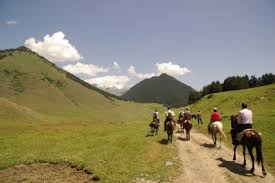Georgia and Montenegro preserving tradition
 Tusheti national park, Georgia
Tusheti national park, GeorgiaThe European Bank for Reconstruction and Development (EBRD) and the Food and Agriculture Organization of the United Nations (FAO) are working to strengthen the agribusiness value chains in a number of sectors in Georgia and Montenegro to upgrade and preserve the quality of local production, resources and increase competitiveness.
Supported by the EBRD and FAO, Georgian and Montenegrin delegations – including public authorities and producers of organic olive oil, fruit juice, cheese, flour, honey and wine – participated in Slow Food’s, Terra Madre Salone del Gusto in Turin, Italy, to learn how to better promote their traditional food specialties.
The biennial event brings together thousands of small-scale producers and hundreds of thousands of visitors from around the world, and for the delegations was a chance to learn from other producers.
Attending forums and workshops they learned from their peers about fighting food waste with creativity and shortening supply chains, food labelling and agritourism.
Ilija Moric, a Montenegrin organic olive oil producer, was “impressed by the innovative ways of storytelling around food. Slow Food is a useful concept for promoting our gastronomy and travel industry,” he said.
Consumer confidence
Montenegro and Georgia have a wealth of agrifood products unique to their countries and producers understand the importance of gaining consumer confidence through quality assurances and labelling.
With the EBRD and FAO’s support, the countries have done just this, through the development of geographical indications (GIs) for several traditional products – like Georgia’s Tushuri guda cheese and Montenegro’s dried beef Crnogorska Goveđa pršuta.
“For consumers, a GI label is shorthand for an origin-linked product of quality, authenticity and tradition,” said Nemanja Grgic, Principal Manager at the EBRD Agribusiness Advisory.
“Many countries have successfully linked GI products with rural tourism – creating jobs, helping small-scale producers secure better prices and re-energizing local economies,” he added.
Linking tourism
FAO agribusiness officer Emilie Vandecandelaere agreed: “Producers recognize the strong connection between food and tourism, and realize they have a competitive advantage by producing high-quality, place-based foods.”
Jelena Krivcevic, a local project partner in Montenegro and Director of the Regional Development Agency, added, “Such an event allows us to share our experiences of how local gastronomy and rural tourism are empowering rural women as they become recognized as entrepreneurs.”
Michele Rumiz, Slow Food program director for the Balkans, said that Slow Food is “proud of its cooperation with the EBRD and FAO.”
“We all understand how important it is to build viable market opportunities for small-scale farmers. Working in Montenegro, we’re able to widen our network in a country still largely unknown, yet full of hidden gastronomic and agricultural treasures,” he added.
A future in agriculture
The EBRD and FAO are supporting Georgia and Montenegro to produce an inventory of its origin-linked foods and traditional specialties. The Georgian inventory, which has been prepared in collaboration with Slow Food, will help protect and promote products steeped in tradition and history.
And following a meeting with Slow Food founder Carlo Petrini, the Georgian delegates are now looking into organizing a Terra Madre event in Georgia.
Giorgi Abulidze, a Georgian producer of Tushuri guda and Terra Madre first-timer, was grateful for the opportunity to learn from producers who share similar challenges.
“I’ve met lots of people from different countries doing different kinds of production, and I’m taking these experiences back with me. Seeing how other cheese producers market their products and integrate tourism has given me – and other producers – a few ideas about how to diversify,” he said.
